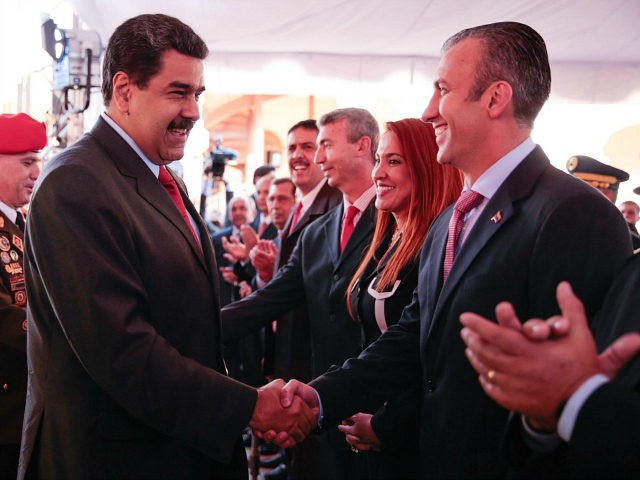Venezuelan socialist dictator Nicolás Maduro has appointed Aragua state governor Tareck El Aissami the nation’s new vice president. Multiple reports have linked El Aissami to both a major cocaine trafficking outlet and the jihadi terror organization Hezbollah.
“I have appointed comrade Tareck El Aissami executive vice president of the Republic to lead in 2017-2018 with his youth, experience, commitment, and courage,” Maduro announced this week on national television, praising the former Interior Minister under Venezuela’s late dictator Hugo Chávez as the right person to lead with aggression and “kung fu.”
El Aissami, a Lebanese-Syrian Venezuelan, has long been accused of ties to major drug trafficking outfits in Latin America, as well as ties to the Shiite terrorist organization Hezbollah, stationed in Lebanon but largely funded by Venezuelan ally Iran.
Namely, multiple former officials in the Chávez government have tied El Aissami to the Cartel de los Soles, a cocaine-trafficking outfit alleged to be run by Venezuelan military officials. “There are a series of substantial ongoing investigations regarding ties between drug trafficking and high-ranking Venezuelan government officials… they involve Aragua Governor Tarek El Aissami and Maduro himself,” Roger Noriega, former Assistant Secretary of State for Western Hemisphere Affairs under George W. Bush, told El Nuevo Herald in 2015. Also among those officials is Maduro’s second-in-command in the Socialist Party (PSUV), Diosdado Cabello.
Leamsy Salazar, Hugo Chávez former head of security who defected to the United States after Chávez’s death, also named El Aissami was one of the Cartel de los Soles’s most trusted high-ranking members, a claim El Aissami dismissed as part of an assault by the “decadent and fascist right.”
El Aissami’s name came up yet again in 2016, when Francisco Flores de Freitas and Efrain Antonio Campo Flores, President Maduro’s nephews, were arrested for allegedly attempting to traffic cocaine into New York. They first claimed the 800 kilograms of cocaine they were carrying on their flight to New York from Haiti belonged to Cabello but later ascribed their ownership to El Aissami. New York’s federal court found the men guilty of drug conspiracy and they now face life in prison.
In addition to Salazar and the Maduro nephews, former Chavista Minister of Finance Rafael Isea, who defected in 2013, accused El Aissami of receiving payments to help drug traffickers ship merchandise out of Venezuela, according to a Wall Street Journal report.
The Brazilian magazine Veja published another report in 2015 suggesting that the American Drug Enforcement Administration (DEA), in the process of investigating El Aissami, found witnesses who have testified that the vice president has worked with both the Marxist terrorist group Revolutionary Armed Forces of Colombia (FARC) and Hezbollah, who both generate revenue through drug trafficking.
The report also claimed that El Aissami was involved in the creation of counterfeit Venezuelan passports to be distributed to Hezbollah members, to allow them to travel more freely than if they had attempted to use Middle Eastern passports; Veja later revealed that El Aissami helped secure asylum in Venezuela for multiple members of the Assad family of Syria. The falsification of such passports, as well as other official state documents, has been the subject of much independent investigation, and Veja is not the only outlet to report it. The Washington-based Center for a Secure Free Society accused El Aissami of involvement in the scheme a year before Veja did, citing “regional intelligence officials.”
Multiple witness reports have surfaced alleging that Venezuela used multiple Mideast embassies to create falsified passports. Among those is the testimony of a former Iraqi embassy worker who fled the country before revealing that “local [Venezuelan] employees delivered visas, passports, birth certificates, and other types of Venezuelan documentation to citizens of Syria, Iraq, Palestine, and, in some cases, Pakistan” for up to $15,000. The book Boomerang Chávez by Spanish journalist Emili Blasco suggest the scheme was the product of a meeting between Maduro and Syrian dictator Bashar al-Assad in 2007.
The Gatestone Institute has also compiled media reports accusing El Aissami of being part of the passport scheme, as well as “recruiting young Venezuelan Arabs to be trained in Hezbollah camps in Southern Lebanon.”
The Center for a Secure Free Society accused El Aissami of establishing “a criminal-terrorist pipeline bringing militant Islamists into Venezuela and surrounding countries, and sending illicit funds from Latin America to the Middle East,” according to the Wall Street Journal. The drug and terrorism accusations against El Aissami often come hand-in-hand; for example, the Spanish newspaper ABC published a report linking El Aissami to Ghazi Nasr al-Dine, a U.S. Treasury-designated Hezbollah supporter who ran political affairs in Venezuela’s Lebanese embassy. In addition to being accused of fundraising for Hezbollah, al-Dine had “apparently collaborated in drug trafficking with the Cartel de los Soles through Tareck El Aissami,” ABC reported.

COMMENTS
Please let us know if you're having issues with commenting.